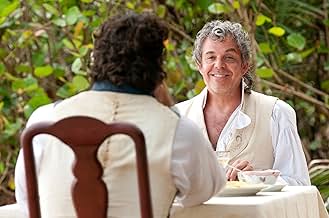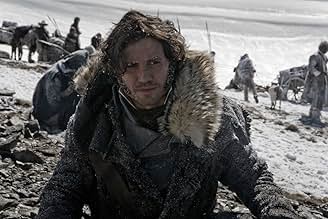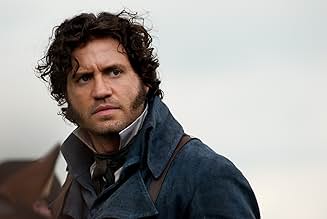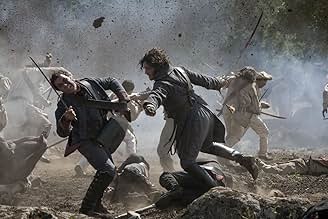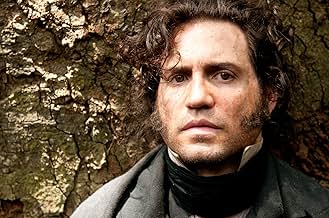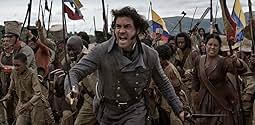IMDb-BEWERTUNG
6,7/10
5720
IHRE BEWERTUNG
Simon Bolivar kämpfte in Südamerika in über 100 Schlachten gegen das spanische Imperium. Er ritt über 70.000 Meilen zu Pferd. Seine Feldzüge erstreckten sich über das doppelte Gebiet Alexand... Alles lesenSimon Bolivar kämpfte in Südamerika in über 100 Schlachten gegen das spanische Imperium. Er ritt über 70.000 Meilen zu Pferd. Seine Feldzüge erstreckten sich über das doppelte Gebiet Alexanders des Großen.Simon Bolivar kämpfte in Südamerika in über 100 Schlachten gegen das spanische Imperium. Er ritt über 70.000 Meilen zu Pferd. Seine Feldzüge erstreckten sich über das doppelte Gebiet Alexanders des Großen.
- Auszeichnungen
- 1 Gewinn & 3 Nominierungen insgesamt
Edgar Ramírez
- Simon Bolivar
- (as Édgar Ramírez)
Marta Benvenuty
- Voice Over
- (as Marta García de Polavieja)
Empfohlene Bewertungen
A spectacular epic, with outstanding photography, costumes, and acting. That said, while Edgar Ramirez did a fine job of acting, he is not quite right as Simon Bolivar, lacking a feeling of introspection and sensitivity that El Libertador must have had. The "Making Of..." extra feature is excellent in showing what a major project this was (filmed on location in France, Spain, and Venezuela). The producers explain that the limits of a theatrical movie kept this from being a detailed account of Bolivar's life and accomplishments. However, they insist on throwing in real-life characters, such as General Antonio Jose de Sucre, Manuela Saenz, and Irishman Daniel O'Leary without much explanation for what their roles were in Bolivar's success (O'Leary was a member of the British Legion which joined the fight for independence, became Bolivar's aide-de-camp, and later wrote a biography of the Liberator). Without some prior knowledge of these characters and events much of the movie is just images, albeit spectacular at times, of key moments in the life of Bolivar and the fight for South American independence. Finally, what's with the nudity and simulated love-making? Totally unnecessary and putting this film out of the reach of a younger audience who would best benefit from it. And, on that topic, how come Maria Valverde (as Bolivar's ill-fated wife Maria Teresa) and Elisa Sednaoui (as Fanny, his Parisian main squeeze) get to be nude but not Juana Acosta (as Manuela Saenz, his dedicated Significant Other during the War for Independence)? Somehow, I feel cheated.
I saw this film a few months back, it was a limited release film. My main reason for watching this film was for the History aspect of it, I've not seen anything that relates to the South American Revolution and was eager to see it, because no filmmaker in Hollywood has made a film with that theme.The film takes place in the early 1800s with Spain dealing with rebellion through the continent, as the people from Latin America seek freedom from Spain. So on to the review, I enjoyed the film greatly, with great visuals, superb acting, great photography. What the film lack and this is what disappointed me the most was story structure, character development. I wanted to get to know some these historic figures a lot more, it seemed rush a times, during certain scenes you wanted to know what this guy was about or some of the female characters. I felt this film had a lot of potential to be something more if they just spend more time on story and the characters.
10robtromp
This is one of the most interesting historical dramas in recent memory - with particular relevance to the USA's current predicament - albeit our oppressors are global multinational companies who have no conventional nationalistic affiliations. The histories of men like Simon Bolivar and Che Guevara bear much scrutiny for the citizens of the USA today - because they were both born of a privileged society, but were driven by their consciences to work against the established power of their era. The one lesson to be learned by the two is that one must steer a very narrow path between collaboration and revolution to be successful, lest one become the tool of the current establishment or the tool of the establishment to be.
Watching this tempts me to compare and contrast with another of America's much-loved founding fathers, George Washington. If you look at the details of their achievement, for better or worse - one wonders how much of their legacy derives from the fact that although both were born into power and privilege - one ended up the richest North American of the day and the owner of numerous slaves and slave employing interests, and the other ended up dead under suspicious circumstances after having clearly declared himself a true champion of the average person - of any race.
Watching this tempts me to compare and contrast with another of America's much-loved founding fathers, George Washington. If you look at the details of their achievement, for better or worse - one wonders how much of their legacy derives from the fact that although both were born into power and privilege - one ended up the richest North American of the day and the owner of numerous slaves and slave employing interests, and the other ended up dead under suspicious circumstances after having clearly declared himself a true champion of the average person - of any race.
Very good movie. Edgar Ramirez is the best Simon Bolivar since Mariano Alvarez (RIP). It's a movie I would own and watch again and recommend it to anyone that wants to learn about this great man and/or sit and enjoy a movie. The photography and design are superb. I felt that Bolivar's struggles were palpable and moving. They should have made it a longer, two-part movie if you ask me. The only thing that I didn't understand much was the final scene. I guess the director just wanted to get artistic, or give it a little twist. Anyone that has read or studied Bolivar, as any Venezuelan has or should, will know what I'm talking about.
Antonio Jose de Sucre needs a whole movie of his own.
Antonio Jose de Sucre needs a whole movie of his own.
Historical drama in Latin American cinema has experienced a comeback in recent years (Morelos, 5 de Mayo, The Conquest) with mostly disastrous results, as the ambition of these projects rarely is met with adequate resources or talent. This film is somewhat of an exception. The most expensive South American film made to date, The Liberator cannot be accused of being unambitious. The 50 million dollar production deserves to be seen if for no other reason than to find out how the money was spent. Venezuelan director Albert Arvelo spared no expense in creating spectacular sets that recreate Madrid, Paris, Bogota, and Caracas, among other cities, and in mobilizing armies of extras to re-stage 19th century battles. The result is convincing. The camera-work and cinematography of Xavi Gimenez (The Machinist, Agora) is equally first class, whether it is drone-shot aerial vistas of the snow-capped Sierra Nevada or hand-held following a fleet of canoes over the Orinoco river. The score, by the phenomenally talented Gustavo Dudamel, elevates the visuals and, while mostly conventional, punctuates orchestral lushness with Amerindian instrumentation much like in Moriccone's The Mission.
If only the script were on the same level. Part biopic and part cinematic history lesson, the film ties to capture almost the entirety of Simon Bolivar's life in under two hours. Instead of choosing a slice of the life of one of the most complex historical figures of the nineteenth century, as Spielberg's Lincoln did effectively, Arvelo foolishly tried to rush us through his entire career, from his time as a young landowner, to a dilettante in Paris, to an almost Moses-like figure liberating an entire continent. Such ambition is nearly impossible to pull off, and what we get is a Wikipedia-like biography on celluloid. We follow Bolivar around without ever understanding motives, emotional or political. The narrative devices are equally problematic. Forced, unnatural dialogue is mixed with shots of Bolivar penning letters while we hear unconvincing voice-overs in Spanish, English and French. As the movie progresses, the less time the director has in explaining the historic or personal issues, and mere minutes are spent in political battles that lasted years. During the last half hour, the film opts for slogans, name-calling and unashamed hero worship.
Edgar Ramirez, who was riveting in Assaya's Carlos, plays the title character and doesn't quite know what to do with the role. He has a screen presence, but he cannot do much with a film has little time for character development. Ramirez is most comfortable in the early scenes, as a sorrowful young widower, but the progression from aristocratic landowner to military commander and towering political leader is unconvincing and he becomes increasingly unlikable. The English banker Torkington (the great Danny Huston), is the only other memorable character, but later in the film is turned into a capitalist-cartoon villain that seems like something out of a propagandist's imagination.
Arvelo, the director, confessed in a Variety interview that "screenwriting is quite possibly the weakest element in Latin American filmmaking." How could I disagree? Still, the accomplishments of the film are undeniable. The film is a visual spectacle, best seen in a large screen, and at the very least left me wanting for someone else to try a real character study of Bolivar.
If only the script were on the same level. Part biopic and part cinematic history lesson, the film ties to capture almost the entirety of Simon Bolivar's life in under two hours. Instead of choosing a slice of the life of one of the most complex historical figures of the nineteenth century, as Spielberg's Lincoln did effectively, Arvelo foolishly tried to rush us through his entire career, from his time as a young landowner, to a dilettante in Paris, to an almost Moses-like figure liberating an entire continent. Such ambition is nearly impossible to pull off, and what we get is a Wikipedia-like biography on celluloid. We follow Bolivar around without ever understanding motives, emotional or political. The narrative devices are equally problematic. Forced, unnatural dialogue is mixed with shots of Bolivar penning letters while we hear unconvincing voice-overs in Spanish, English and French. As the movie progresses, the less time the director has in explaining the historic or personal issues, and mere minutes are spent in political battles that lasted years. During the last half hour, the film opts for slogans, name-calling and unashamed hero worship.
Edgar Ramirez, who was riveting in Assaya's Carlos, plays the title character and doesn't quite know what to do with the role. He has a screen presence, but he cannot do much with a film has little time for character development. Ramirez is most comfortable in the early scenes, as a sorrowful young widower, but the progression from aristocratic landowner to military commander and towering political leader is unconvincing and he becomes increasingly unlikable. The English banker Torkington (the great Danny Huston), is the only other memorable character, but later in the film is turned into a capitalist-cartoon villain that seems like something out of a propagandist's imagination.
Arvelo, the director, confessed in a Variety interview that "screenwriting is quite possibly the weakest element in Latin American filmmaking." How could I disagree? Still, the accomplishments of the film are undeniable. The film is a visual spectacle, best seen in a large screen, and at the very least left me wanting for someone else to try a real character study of Bolivar.
Wusstest du schon
- WissenswertesOfficial submission of Venezuela to the best foreign language film category of the 87th Academy Awards 2015. Made the shortlist of 9 films.
- Zitate
Simón Rodriguez: I feel sorry for you, Simon. You're so poor that the only thing you have is money.
- VerbindungenFeatured in Cine Invisible (2023)
Top-Auswahl
Melde dich zum Bewerten an und greife auf die Watchlist für personalisierte Empfehlungen zu.
- How long is The Liberator?Powered by Alexa
Details
Box Office
- Budget
- 50.000.000 $ (geschätzt)
- Bruttoertrag in den USA und Kanada
- 113.067 $
- Eröffnungswochenende in den USA und in Kanada
- 69.992 $
- 5. Okt. 2014
- Weltweiter Bruttoertrag
- 5.082.098 $
- Laufzeit1 Stunde 59 Minuten
- Farbe
- Sound-Mix
- Seitenverhältnis
- 2.35 : 1
Zu dieser Seite beitragen
Bearbeitung vorschlagen oder fehlenden Inhalt hinzufügen



